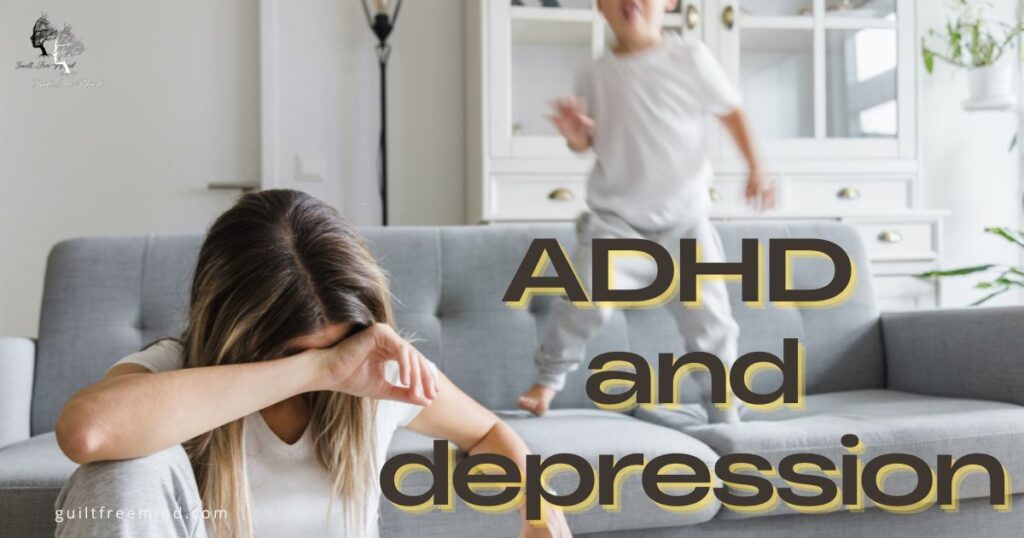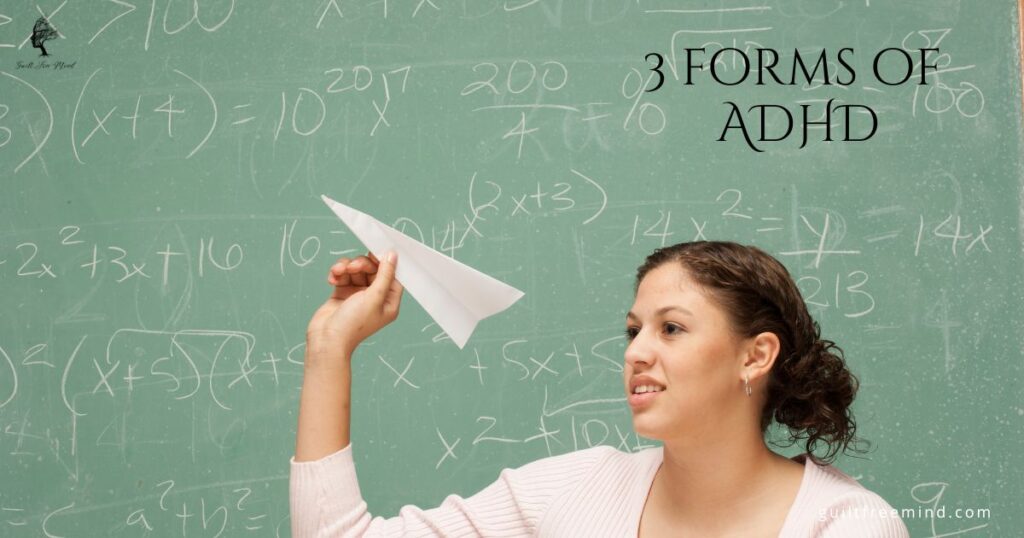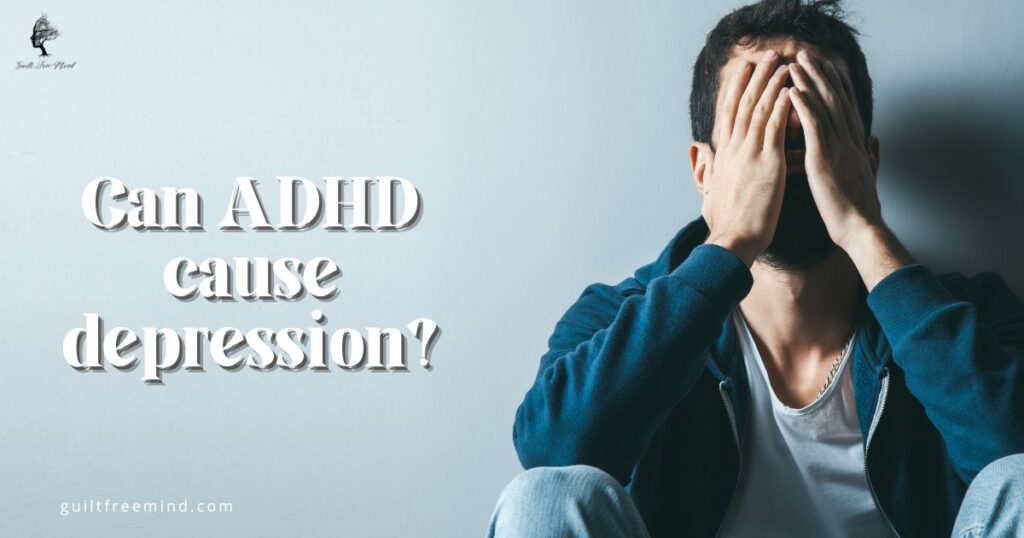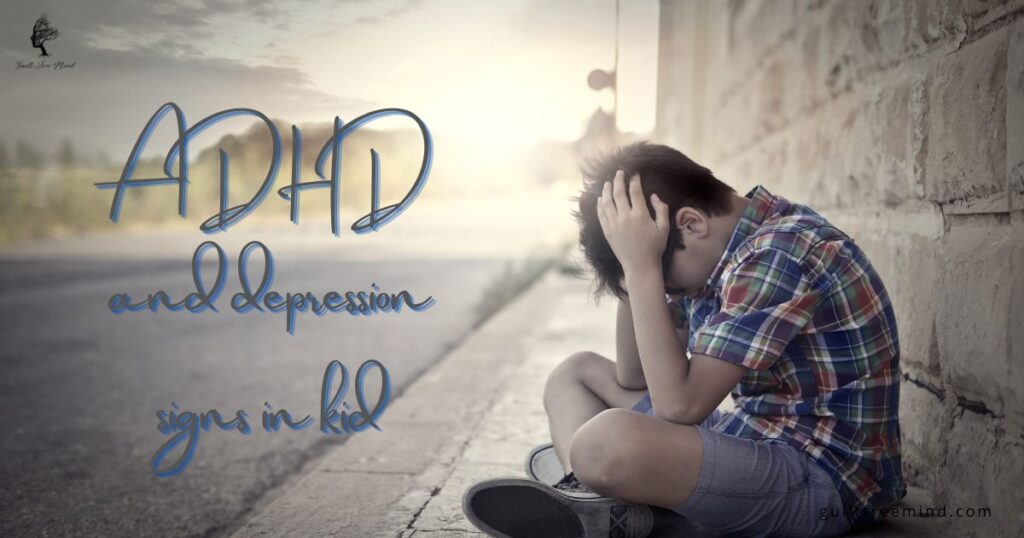In the last three blog posts, I have been discussing ADHD, its causes, and its symptoms. A lot of overlap has been seen between ADHD and depression. However, does this mean that the two disorders are similar? If you are suffering from attention deficit hyperactivity disorder, does this mean that there is a higher chance for you to develop depression? What does it mean in terms of lifestyle changes, treatment, and prognosis? Let’s find out the answers.

Table of Contents
Can you suffer from ADHD and depression?
Often ADHD and depression occur in the same person. It has been observed that depression tends to occur 2.7 times higher in the case of people suffering from ADHD than those who are not. Studies also show that around 30% of people with ADHD will also have depressive episodes or suffer from mood disorders during their lifetime. However, before I get into the details of ADHD and depression, you need to understand what is ADHD and depression in the first place.
Understanding ADHD
Let’s start with understanding ADHD first. Attention deficit hyperactivity disorder or ADHD is a neurodevelopmental problem. It usually presents during early childhood and persists throughout the lifetime of the individual. People who are diagnosed with ADHD often exhibit executive function deficits. In most cases, they struggle to sit still, are very impulsive, find it challenging to complete their tasks, get distracted easily, are highly disorganized, and are constantly losing their things and missing appointments.
ADHD can be categorized into three different presentation formats
Inattentiveness
Those who suffer from inattentive ADHD find it very difficult to sustain their attention for the tasks that they feel are boring. They also have difficulty organizing their thoughts and sticking to a conversation. They may easily get distracted by the things that are going on around them or pursue their self-dialogue that’s happening in their mind.
Hyperactive impulsiveness
Those who suffer from hyperactive-impulsive ADHD have a hard time sitting still. You may notice that such people are constantly moving or restless. They also have a high impulsive streak. They are known to act out spontaneously without thinking.
Combination of hyperactive-impulsive and inattentive
Those who suffer from this type of ADHD show a combined presentation of both hyperactive-impulsive and inattentive symptoms.

Understanding depression
Depression is not a phase in one’s life. It is also not a case of the blues or simple sadness. Depression is a real mental health issue and should be treated as such. Many people go to recurrent episodes of depression which may last anywhere from a period of a few weeks to a period of a few months or even longer.
Most common signs and symptoms of depression:
- Feeling empty, hopeless or sad
- Constantly feeling frustrated, restless, and irritable
- Loss of interest in the everyday tasks that you enjoyed doing
- Having a hard time concentrating on school or office work
- No interest in eating
- Eating too little or too much
- Having difficulty staying awake or falling asleep
- Feeling constantly fatigued or overtired
Depression makes it impossible for a person to be consistent in their everyday tasks like going to school or work, focusing on personal hygiene, eating meals that are healthy, etc. Depression can also take a life-threatening turn if it is severe and the person starts to focus on suicide ideation.
Understanding the connection between depression and ADHD
If you focus on the symptoms of ADHD and depression, you will notice many overlaps between the two. This can make it tough to diagnose and treat the two disorders. For example, difficulty focusing is a symptom that is common in the case of both ADHD and depression. If you are on medication to help with your ADHD, it may cause changes in your sleeping or eating habits. Changes in eating or sleeping habits can be taken as signs of depression as well. In the case of kids, impulsivity and hyperactivity that may occur due to depression can also be seen as a symptom of ADHD.
Facts about ADHD and depression overlap
- Teens suffering from ADHD are ten times more inclined to develop depression than their peers who are not suffering from ADHD.
- Depression is three times more prevalent in those suffering from ADHD than those without the disorder.
- Amongst people diagnosed with depression, the rate of ADHD diagnosis is around 30 to 40%.
- 70% of people diagnosed with ADHD may experience depression later in life.
A study conducted in the Netherlands found that the ADHD rates were much higher in those already suffering from chronic depression, comorbid anxiety, early onset depression, or severe depression. This data implicates a strong relationship between depression and ADHD. Furthermore, suicide ideation is higher in the case of those suffering from ADHD. A study conducted on 627 undergraduates showed that ADHD diagnosis positively correlated with suicide ideation. Multiple factors can affect this relationship like emotional awareness, negative emotion management, and behavior that is goal-oriented.
How to identify if the person is suffering from depression or ADHD?
In many cases, it can be challenging to identify if the patient is suffering from ADHD or depression due to overlapping symptoms. However, ADHD medications can also lead to certain side effects that may mimic the symptoms of depression, like appetite loss and sleeping difficulties. Let’s take a deeper look at the differences between ADHD and depression.
Mood
A person who is suffering from ADHD can experience mood lability. Mood lability means that the person is either overly sensitive or has thin skin. These people experience quick transitions from positive emotions like enthusiasm, excitement, amusement, and happiness to negative feelings like sadness. Whether they are experiencing a high point or low point in their feelings, they are always more sensitive than anyone without ADHD.
Emotional or mood lability is also seen in others suffering from personality disorders like bipolar disorder, borderline personality disorder, and post-traumatic stress disorder [PTSD].
Emotional lability vs. moodiness
Many times, people confuse emotional lability with moodiness. Emotional lability is very different from moodiness or someone who gets angry quickly. People who suffer from emotional lability experience periods of a particular emotion. However, there is no trigger behind this emotional fluctuation. Their feelings may fluctuate unpredictably. They may seem happy in one minute and angry in the next. These sudden mood shifts are not only tricky and frustrating for all the person suffering, but it also takes a heavy toll on the family and friends. Closed ones are constantly left in confusion, trying to understand what brought this change in the first place.
Motivation
In the case of those ADHD-affected folks, they can feel the motivation if the work that they are doing is of interest to them. This is because they do not feel tired and have a very active mind. However, in the case of depression, even if the person finds the task enjoyable, they find it hard to complete because of the state of their mood.
Sleep
People with ADHD find it very hard to fall asleep quickly. This is because they have a very active mind and do not feel tired easily. However, a person who suffers from depression may constantly feel tired but still unable to sleep because of the negative thoughts allowing them. Depression is also accompanied by insomnia which may keep the person awake throughout the night or causes the person to sleep excessively.
Period
Depressive symptoms generally tend to last from a few weeks to a few months to a few years. However, the symptoms of ADHD last for a lifetime. In the case of depression, there is a chance that the person can improve and come back to normal functioning levels. But, this is not the case with ADHD.
Can ADHD lead to depression?
Yes, ADHD can cause depression in people if they are having a hard time managing the symptoms. Kids may find it hard to get along with their friends at school, while adults may face issues at work. The prime problem with ADHD is that it isolates the individual. If the person cannot reach out to someone about their problems, it is more than likely to cause depression in the individual.

So far, the factors of ADHD that contribute to depression are not known. However, both these conditions have a genetic background to them. People suffering from ADHD and depression most often have a family member or a parent who suffers from the same as well.
Which population subsets are more likely to develop comorbid depression and ADHD?
A variety of risk factors have come into the picture that are responsible for pushing a person towards suffering from both ADHD and depression. Here are some of them.
Female
Even though ADHD is more often seen in males than females, if a female has ADHD, they are more likely to develop depression along with ADHD.
Inattentive type
Studies have shown that people with inattentive type ADHD more commonly surface with a diagnosis of depression later in their lives.
The mental health of the mother
If the mother undergoes depression during her pregnancy, there is a high chance that the child from that pregnancy will also later be diagnosed with depression, ADHD, or both of them.
Early onset
If a child is diagnosed with ADHD, especially during the early childhood years, it can lead to an increased risk of suicidal ideation and depression later in life.
Not opting for treatment.
Those who leave their ADHD untreated and unattended are at higher risk of suffering from depression because of the presence of secondary issues like low self-esteem.
Certain medications
Unfortunately, some of the medications that are used to treat ADHD can also have depression as a side effect. They can worsen the symptoms of depression if you already have it. These medications are also known to induce symptoms that are similar to depression.
Signs of ADHD and depression in children
Since children are in the physical, emotional, and mental developmental stages, they may not understand or even realize that they are suffering from a mental health issue. An ADHD child usually has low self-esteem since unusual behavior can cause isolation and bullying by peers. The presence of low self-esteem, behavioral issues, and not fitting well with friends and classmates can cause depression.
Signs that a child with ADHD is suffering from depression
- Failing grades
- Not properly doing homework
- Not attending school
- Constantly feeling hopeless
- Changes in the eating pattern
- Changes in sleeping pattern
- Lots of interest in favorite activities
- Withdrawing from friends and family
- constantly feeling low

Increase in ADHD-related behavior due to depression
- Increase in inattention
- Extremely disorganized and overwhelmed all the time
- More impulsive behavior and acting out
Understanding untreated ADHD and depression
If you suffer from ADHD, you are at four times higher risk of developing depression. As I mentioned, this risk is even higher in case you belong to the impulsive or Inattentive type of ADHD. If ADHD is left completely untreated, it can lead to depression because of the chronic frustration and disappointment that a person with ADHD constantly experiences in their day-to-day life.
The problems that a person faces from ADHD can lead to trouble in interpersonal relationships, work environment, school, etc. They find it hard to function normally in their day-to-day environment. This leads to them not feeling good about themselves. They also suffer from disappointment due to their negative self-concept and low self-esteem.
If ADHD is properly treated and managed, it’s easier to deal with their problems at home, at school, and workplace. This will alleviate the sense of low self-esteem and negative self-concept. Therefore, there is a high chance that such people can prevent and overcome depression.
Other ADHD components that influence the occurrence of depression
Dopamine
People who suffer from ADHD have dysregulation in the production of dopamine. Dopamine is a neurochemical responsible for causing motivation in people. Those who suffer from ADHD do not produce the same level of dopamine as an average person. This lack of dopamine causes dysregulation in the motivation and reward system. Therefore, their brain finds it hard to motivate them to work. Therefore, the inattentiveness.
Dysregulation of emotions
ADHD sufferers also undergo emotional dysregulation. In most cases, they will experience emotions more intensively than a person without ADHD. People with ADHD also find it challenging to soothe difficult emotions and have a tough time transitioning from one feeling to the other and distracting themselves if they are stuck in negative emotions. All of these factors can contribute to a high risk of developing depression.
Comorbidities in ADHD
In most cases, ADHD does not affect a person all by itself. Usually, ADHD is accompanied by other disorders like bipolar disorder, depression, substance abuse disorder, binge eating disorder, learning disability, or obsessive-compulsive disorder. Therefore, ADHD is also referred to as an associated or comorbid disorder.
The presence of such comorbidities also causes individuals to be at a higher risk for developing depression. For example, if a person is suffering from both OCD and ADHD, they will have to navigate through demanding conditions. They may have a thousand different things going on in their head constantly with no ending to them. This can cause them to shut down and feel helpless. They also find it hard to reach out to others because no one else can understand what they are going through.
ADHD and depression treatment
Your doctor may prescribe you medications and counseling to treat ADHD and depression. If the patient is a child under five years of age, behavioral therapy is the first line of treatment. If the child is six years or above and is suffering from ADHD and depression, mental health practitioners would go for behavioral therapy along with medication.
Helping a child suffering from ADHD and depression
Caregivers and parents of the kid with ADHD should constantly be monitoring changes in behavior and be on the lookout for any sign of depression or any other type of mood or behavioral disorder. There are a variety of ways by which you can offer support to the child:
Communicate with the class teacher
Having the teacher in the loop about the child’s condition can allow the teacher to keep track of the child’s behavior and progress in the classroom environment. Educational support workers and teachers may also be able to offer valuable suggestions to the parents about how they can help their children in their studies and other activities.

Routine and structure
Having a set structure and routine can be of immense help in helping your child stay organized and not feel overwhelmed. You also work with the kid and help them develop time management skills. A crucial way to manage the time would be having a to-do list or a timetable that divides all the activities and chores of the child according to the time. Furthermore, you can use positive reinforcement and reward systems to help your child work better and fulfill goals.
Communicate with the child
This is not only for kids suffering from ADHD but also for four normal kids. Parents should always talk to their children and ask how they feel. Make sure your child knows that they are not alone. They can always reach out to you if they are struck in any kind of problem. Having your child be open to you also allows you, as a parent or a caregiver, to track the child’s concerns and find support during the stages of early depression itself.
Family and child counseling
You can also go for child or family counseling. This will provide your child with a safe space and allow families to express their feelings and concerns. You may also find new solutions which are suitable for both the child and family members.
In the case of kids above six years of age, the mental health practitioner can also prescribe medications.
Medications available for the treatment of ADHD and depression
Stimulants like Adderall are typically given for ADHD. They are responsible for increasing the production of dopamine, which helps improve the person’s focus. However, one of the side effects is trouble sleeping and lack of appetite. The psychiatrist can also prescribe non-stimulants like Strattera or antidepressants in case the patient is suffering from depression, like Wellbutrin.
Cognitive behavioral therapy
Cognitive behavioral therapy is primarily used to help people manage their stress levels and mood. The constant presence of emotional stress can increase a person’s depression and anxiety. Therefore, understanding how to manage their mood is crucial.
Focus on activities
ADHD worsens if the person starts to feel bored. Therefore, one way to prevent yourself from feeling bored can be to have an activity closet. A place where all your activities are stored that can be done and explored when you are feeling particularly bored. This closet can contain crafts you like doing, podcasts you listen to, books that you love to read, etc. Therefore, whenever you’re feeling bored, you can pick out an activity from the activity closet and focus on that.

Reach out
If you are an adult suffering from ADHD and depression, reach out to your psychologist. Do not try to diagnose yourself on your own. Psychologists undergo years of training to be able to accurately diagnose your condition. Therefore, self-diagnosis and medication are not an option. Always consult a psychologist. You may be given antidepressants and ADHD drugs to help you combat the symptoms. Never stop the drugs on your own. Always consult your mental health practitioner. They will taper the dose and stop the drug. However, mental health drugs should never be stopped suddenly.
Conclusion
Having ADHD predisposes a person to develop depression during childhood and later in life. How can this be combatted? Since ADHD and depression share overlapping symptoms, a few basic self-care measures would work for both of them. Thus, focus on eating healthy meals, regular exercise, and practicing good sleep and hygiene.
Do you suffer from ADHD and depression? What is your coping mechanism? Have you used any behavioral therapy techniques to combat your problem? Please share your experience in the comment section below. Your experiences may motivate someone else to reach out and get the help they desperately need.
If you found this blog article insightful, please subscribe to Guilt Free Mind. Your subscription will allow me to notify you of new blog post releases. If you like watching videos, subscribe to the YouTube channel of Guilt Free Mind. Remember to ring the notification bell. You can either put your queries in the comment section below or reach out to me on any of my social media channels. If you want to directly get in touch with me, you can find me on Twitch from Tuesdays to Sundays (11:00 am to 7:00 pm Indian Standard Time]. I do coworking and mental health sessions. Coworking sessions are every day, while the mental health sessions take place on Tuesdays and Fridays (4:30 to 6:30 pm Indian Standard Time).
See you in my next blog post
